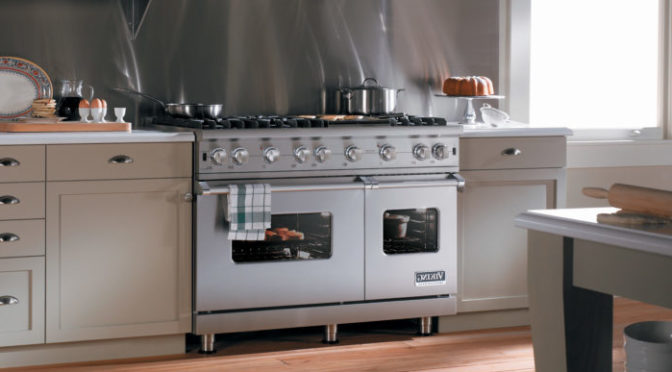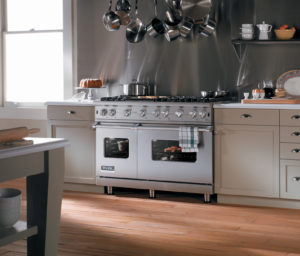
If you’re in the market for a high end 48″ gas range, you’ve probably come across the same brand names over and over again: Viking, Wolf, Thor Kitchen, Kucht, Vulcan, Thermador, La Cornue, BlueStar…it’s a rotating cast of boutique brands offering ranges and ovens that cost as much as many pay for used cars. However, each brand inevitably has its horror stories and detractors, and it can be hard to separate the wheat from the chaff. There’s no question that a 48″ stainless steel range will look amazing in your kitchen, but what if it doesn’t heat properly, or if you get poor service when you need it? Today we’ll answer frequently asked questions based on knowledge from people who made the multi-thousand dollar commitment to bring home a high-end natural gas or liquid propane range.
How do build quality and reliability vary by brand?

While each brand has its advocates and detractors, the truth is that each manufacturer is capable of creating quality ranges and the occasional dud. We’ve seen Vikings last for decades in some cases and break down repeatedly after a year or two in others. We have noticed a general tendency for Thermador models to need silly but crippling repairs, such as broken racks due to poor welding or lights no longer lighting and requiring expensive repairs. Overall, we’d recommend Viking if you’ve got deeper pockets and Thor Kitchen or Kucht if you’re on a smaller budget but still want high levels of quality control. We’d rank brands like La Cornue and BlueStar equivalently to Viking, Thor Kitchen, and Kucht, keeping in mind, of course, that individual experiences can and will vary.
For maximum reliability and durability, choose classic, minimal designs
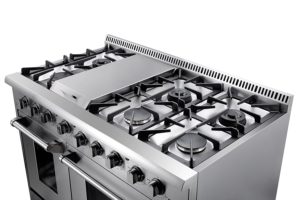
No matter what the marketing says, price doesn’t parallel reliability once every range you’re comparing is already at a premium level. To put it another way, you’re not necessarily going to get more years out of a $10,000 Viking or Wolf range than you will from a cheaper brand once you’re dealing with multi-thousand dollar ranges; what matters much more tends to be the number of electronic components inside each appliance.
Most ranges stop working when their circuit boards do, so avoid electronics whenever possible
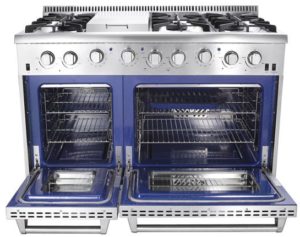
To put it simply, electronic circuit boards lead to electronic brain damage, and it often becomes cheaper to replace the range than to repair and replace the internal circuitry. As a result, if you want a range to last as long as possible, focus on getting a model with as few lights, displays, and other “smart” components as possible. A $5,000 Thor Kitchen HRG4808U 48″ range, for example, is one of the most reliable ranges money can buy, simply because it includes next to no electronics; you can control it almost completely through metal knobs, which are much less likely to break down over decades than fragile computerized systems.
Is a dual fuel range worth it if you primarily bake with the ovens?

Dual fuel ranges are a wonderful alternative to gas ranges if you spend the majority of your kitchen time baking instead of cooking. Even if you primarily cook, if you spend a significant amount of time baking, you’ll want to consider a dual fuel range. In a dual fuel system, the burners are powered by gas while the ovens run on electricity. The advantage here is that internal oven temperatures can be set (and stay where they’re set) very precisely due to the natural stability of radiated heat from electric coils compared to heat supplied from gas-fueled flames. To put it simply, gas ovens have more trouble maintaining consistent temperatures than electric ones, which leads to less even baking in comparison. On the other end, few would argue that an electric range can cook as quickly or powerfully as a range topped with flaming gas burners. A dual fuel range gives you the best of both worlds.
Is a Viking or Wolf 48″ range really that much better than an equivalent Thor Kitchen range?
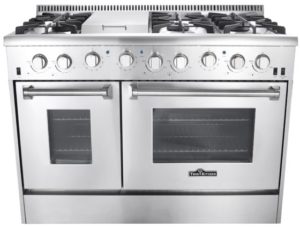
This, in the end, is the question that brings most readers to us: you want to know whether it’s worth spending $9,000 to bring home a 48″ Viking range like the VGCC5488BSS when Thor Kitchen promises the same performance for $4,500 less (e.g., from the HRG4808U). The truth is that it’s getting harder and harder to tell the difference between older, more established brands like Viking and newer increasingly competitive brands like Thor Kitchen–particularly when the ranges are matched in specifications.
There are differences, but the differences aren’t tied to cooking performance in most cases

We’re not going to tell you that there’s no reason whatsoever to buy a Viking or Wolf over a Thor Kitchen. When we look closely, we still see some differences–the Vikings are generally made from thicker gauge steel, for example, and the name undoubtedly carries more prestige among high end home designers and homeowners–but these differences don’t matter when it comes to cooking performance or reliability. The fact of the matter is that for most practical purposes–that is, those related to cooking and baking–you can get just as much food out of a Thor Kitchen as you can from a Viking. And if you balk at the idea of spending five figures on a range, a $5,000 Thor Kitchen is a downright bargain in comparison.
![]() You can buy the Viking VGCC5488BSS 8-burner 48″ professional gas range here on Amazon or buy the Thor Kitchen HRG4808U 6-burner range with a double oven here. Alternatively, you can buy the Thor Kitchen HRG4804U 6-burner range and double oven here. If you want a dual fuel range, we’d recommend the Viking VDSC5488BSS range here.
You can buy the Viking VGCC5488BSS 8-burner 48″ professional gas range here on Amazon or buy the Thor Kitchen HRG4808U 6-burner range with a double oven here. Alternatively, you can buy the Thor Kitchen HRG4804U 6-burner range and double oven here. If you want a dual fuel range, we’d recommend the Viking VDSC5488BSS range here.
![]() Canadians, unfortunately, neither Viking range is readily available. However, you can buy two excellent alternative 48″ ranges here: The Thor Kitchen HRG4808U 6-burner gas range and double oven here, or the Thor Kitchen HRG4804U 6-burner range with double oven, here.
Canadians, unfortunately, neither Viking range is readily available. However, you can buy two excellent alternative 48″ ranges here: The Thor Kitchen HRG4808U 6-burner gas range and double oven here, or the Thor Kitchen HRG4804U 6-burner range with double oven, here.
 If you find our research on PMC helpful, you can follow our efforts to keep maniacally reviewing home appliances by shopping through our links above. We promise to keep fighting the good fight against every horror children, animals, and grown, yet messy humans can inflict upon a clean home.
If you find our research on PMC helpful, you can follow our efforts to keep maniacally reviewing home appliances by shopping through our links above. We promise to keep fighting the good fight against every horror children, animals, and grown, yet messy humans can inflict upon a clean home.

